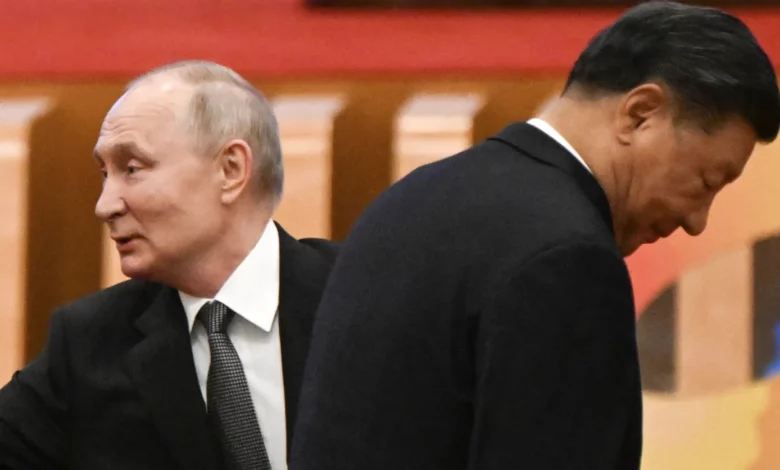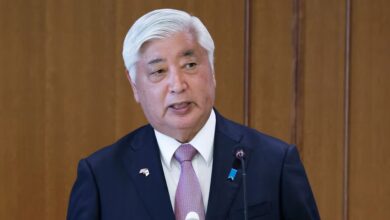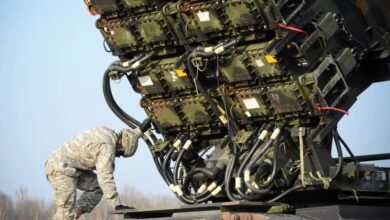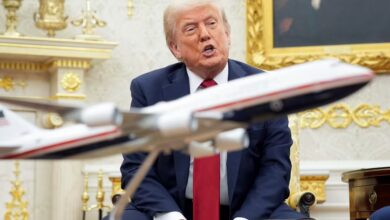
Chinese leader Xi Jinping will welcome Vladimir Putin to China on Thursday for the Russian president’s second visit in less than a year – the latest sign of their growing alignment amid hardening global fault lines as conflict devastates Gaza and Ukraine.
Putin will arrive in China just over a week since entering a new term in office, extending his autocratic rule until 2030 – the result of an election without any true opposition.
His visit, set to take place May 16-17, according to Chinese state media, mirrors Xi’s own state visit to Moscow just over a year ago, where he marked the norm-shattering start of a new term as president – like Putin, after rewriting rules around how long leaders can serve.
This time, their meeting comes months ahead of the American presidential elections and as Washington faces mounting international backlash over its support for Israel’s war on Gaza. It’s set to provide a platform for the leaders to discuss how all this can advance their shared ambition to degrade and offer an alternative to American power.
The visit also comes as the two leaders operate within what observers say is a loose but growing coordination of interests between avowedly anti-American countries Iran and North Korea. Pyongyang – which has an economy almost entirely dependent of China – is believed by Western governments to be aiding Russia with war supplies, as is Tehran, which is being bolstered economically by Russia and China and is a powerful player in the conflict in the Middle East.
Putin will arrive for the two-day state visit emboldened by the survival of his wartime economy and amid a major new offensive along key points of the front line in Ukraine. For Xi, freshly returned from a European tour, the visit is an opportunity to showcase that his allegiance to Putin has not broken his ability to engage with the West.
But the optics of the strident allegiance belie a more challenging picture.
Pressure is mounting on Beijing from Washington over its alleged support for Russia’s defense industry. In Europe, Xi had to navigate sharp tensions in France – only welcomed with fanfare in Serbia and Hungary, while China’s key partner, Russia, remains isolated on the world stage.
Xi has ramped up his calls for Europe and other countries to help the world avoid a “Cold War,” suggesting they resist what Beijing sees as US efforts to contain China.
But the leader himself – including as he hosts Putin this week– is seen to be tightening relationships to underscore a growing global split that could deepen divisions with the West, whose technology and investment, experts say, China needs.
“We live in a more dangerous world, authoritarian powers are increasingly aligned. Russia is receiving support for its war of aggression from China, Iran and North Korea,” NATO chief Jens Stoltenberg warned last month.
“This reminds us that security is not regional, security is global. And we must work with our like-minded partners around the world to preserve and protect transatlantic security.”
‘Grand strategy’
Looming over Xi’s meeting with Putin this week are Western threats of more sweeping actions against his country if it continues sending certain goods to Russia. The US government says dual-use exports are enabling Russia to build up its defense industry.
“The pressures are arguably bigger than they were in the past two years,” said Li Mingjiang, an associate professor of international relations at Singapore’s Nanyang Technological University, pointing to a new raft of sanctions from the US earlier this month targeting Chinese firms – and the potential for more, including from the EU.
China has said it closely monitors exports of dual-use goods and denies its trade with Russia is anything outside of normal bilateral exchange.
Even close observers of Xi’s opaque decision-making are divided on whether all this means the Chinese leader will seek to use his time with Putin this week to advocate for a settlement in the conflict soon.
But China’s official trade data from March and April both show declines in exports to Russia compared with the same periods the previous year – indicating Beijing may be taking steps to protect against Western sanctions hitting deeper into its commercial and financial sectors.
Any recalibration there, however, is unlikely to stem deepening of cooperation across a range of areas between the two countries, who hold regular military drills and diplomatic exchanges. It’s also unlikely to change Beijing’s bottom line when it comes to Russia’s war, analysts say.
“Russia is fundamental to China’s grand strategy,” said Manoj Kewalramani, who heads Indo-Pacific studies at the Takshashila Institution research center in Bangalore. While Beijing doesn’t want escalation, “there is a deep interest in making sure that Russia doesn’t lose the war,” he said.




